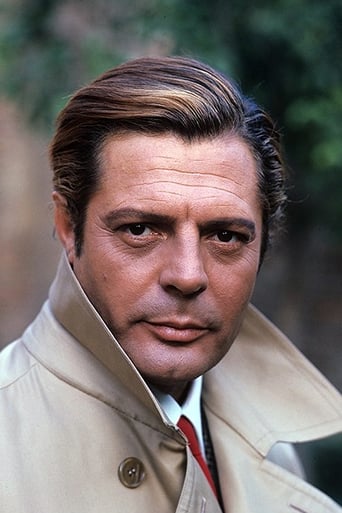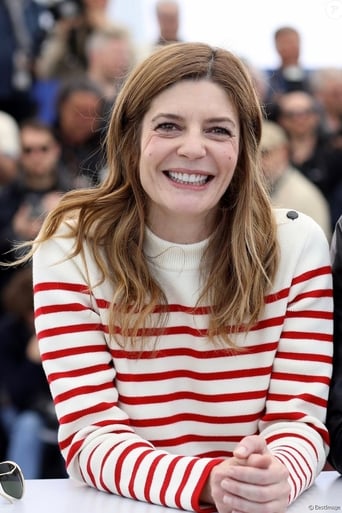Allison Davies
The film never slows down or bores, plunging from one harrowing sequence to the next.
Maleeha Vincent
It's funny, it's tense, it features two great performances from two actors and the director expertly creates a web of odd tension where you actually don't know what is happening for the majority of the run time.
Francene Odetta
It's simply great fun, a winsome film and an occasionally over-the-top luxury fantasy that never flags.
Jackson Booth-Millard
This French film was another one I found in the 1001 Movies You Must See Before You Die book, being a 90s film it was odd that it was hard to find to watch, but I did eventually find it and wanted to see if it was worthy of the book placement. Basically Marcello Mastroianni plays a man with multiple personalities, the film focuses on four, travelling Parisian salesman Mateo Strano, Sorbonne university professor of negative anthropology Georges Vickers, a mute country house Butler working for a wealthy newlywed couple, and industrial magnate Luc Alamand. Mateo shows up at the home of the wife he abandoned twenty years ago, María (Marisa Paredes), she remarried André (Féodor Atkine), he tells his story to André that he has in fact been living in an apartment across the street the entire time, he lures André to him and murders him with a hammer, María suspects nothing as he returns calmly, she even introduces him to their adopted daughter. George Vickers still lives with his cranky mother until he becomes a tramp, on the streets he encounters streetwalker Tania (Anna Galiena) with a passion for philosophy, the hooker and tramp stay together until Vickers returns and leaves, following this George discovers Tania is in fact president of a major corporation, and when he learns she has been jailed for the attempted murder of her creepy ex-husband Vickers comes to her rescue. The newlywed couple are struggling a little, but their lives change dramatically when a benefactor provides them a marvellous country house, they are also given a mute butler who serves them well, but they slowly figure out their valet, who actually owns the château, is plotting to kill them with slow poising, to steal their fortune, terrified the leave, but he finds them and demands they give him their baby daughter, he gives the child to Maria, Mateo's ex-wife. Finally Luc Alamand is in trouble, learning that potential clients he wants to impress want to meet his wife, daughter and sister, and they are actually coming, the stress causes his other personalities to emerge, each have wildly different lives, but are all clearly similar characters, and it is all bound to end in s=destruction and confusion for himself and some others. Also starring Melvil Poupaud as Martin, Chiara Mastroianni as Cécile, Arielle Dombasle as Hélène and Jean-Yves Gautier as Mario. Mastroianni is amusing playing the four different personalities embodied in one man, the story is okay but rather hard to follow, and to be honest I didn't laugh at a lot of it, I know it is meant to be funny, and I'm not sure the placing in the 1001 Movies book is one I agree with, but it was an interesting enough fantasy comedy drama. Good!
chaos-rampant
With his work in the 80's Ruiz managed to cast upon the French conundrums about time and reality an oblique, dreamlike light. A light that diffused the essay into heady magic, into shadow play that was dangerous and sultry with the impossible. He would see Welles from the other side of the mirror, from the fictional looking in.None of that here, instead dry vignettes like a French Bunuel. Some wit and irreverence and a few touches about convergent realities that remind of his earlier films are lost in too much transparence.The structure is reminiscent of something he would do. A surreal comedy where Marcello Mastroyanni is three different characters. All three stories are framed by a narrator reading them for a radio program. Eventually the three lives converge, worlds overlap under a single author who weaves himself in fictions that inexplicably become real, but they converge and overlap too late and no real sparks fly.Whereas earlier Ruiz trusted intuition to take him to the place where ideas mean things, here he starts from ideas and structures as he goes on. It is all scaffold, elaborate, suffocating scaffold, with no edifice to support. Ideas cast adrift without anchor. Compare with the richness of his 80's films about sailing inwards.
MatBrewster
Chilean director Raul Ruiz created a weird, wild, fantastic world with Three Lives and Only One Death. Marcello Mastroianni plays four different characters in as many different stories that at first seem completely separate, but by the films end are wholly intertwined. It is beautifully, almost mystically shot, effectively using shadows, light, and computer imagery to create painted like imagery. It is a bit confusing, but wholly satisfying film.In the first story Mastroianni plays a salesman who walked out on his wife (Marisa Paredes) twenty years ago. The wife has since found another husband (Feodor Atkine) and is living a seemingly happy life. For reasons left unexplained Mastroianni suddenly decides he wants his old life back. He catches the new husband, at a Tabac and offers to pay him 1,000 francs for a hour of his time. What proceeds is an imaginative, fantastic tale of why Mastroianni has been gone for twenty years. It is far to complicated to explain here, but lets say it involves a room with moving walls and tiny fairies who prefer to eat franc bills, but will settle for newspaper. The end of the story finds Mastroianni wanting to leave the second husband in the fantastic room, while he moves back in with his wife.In the second story Mastroianni plays a successful professor who, for reasons that are all his own, become a beggar, and a rather successful one at that. He befriends a prostitute (Anna Galiena), who he later finds out isn't all she pretends to be, and whose husband (Jacques Pieiller)is something of a psychopath.In the third story a young couple (Chiara Mastroianni and Melvil Poupaud) find themselves being mysteriously supported by an unnamed friend. After months of finding 1,000 francs in their mail box each week, they learn this mysterious stranger has died and left them his mansion. The catch is they must keep on a peculiar butler (Mastroianni of course) or lose everything. The fourth story is really a means to tie all three stories together, and yes, it is weird. There is a lot going on throughout the film. It is visually stunning, complex in story, and a delight throughout. It is the type of film that really deserves a second, and third viewing to allow thoughtful absorption of the many details. In what was his second to last film before his death, Mastroianni does a masterful job playing these varied, and interesting characters.It is a film not meant for everyone. The story is a weird and complex as anything put out by David Lynch. But for the lover of cinema, there is much to appease the appetite. It is a beautiful, layered, surreal film that is a true pleasure to watch.Like this review? Go to www.midnitcafe.blogspot.com for more.
gridoon
Raul Ruiz has crafted a genuinely surrealistic film, dealing with such subjects as identity, time, chance and the cyclical pattern of events, but for all his camera tricks (some of which are outstanding), his storytelling is rather flat, and his characters talk too much. Ruiz asks for too much patience and too many allowances on the part of the viewer, without giving his stories the kicker that would justify them; his one big revelation was all but spoiled in pretty much every review of the film, not to mention its own title. (*1/2)




